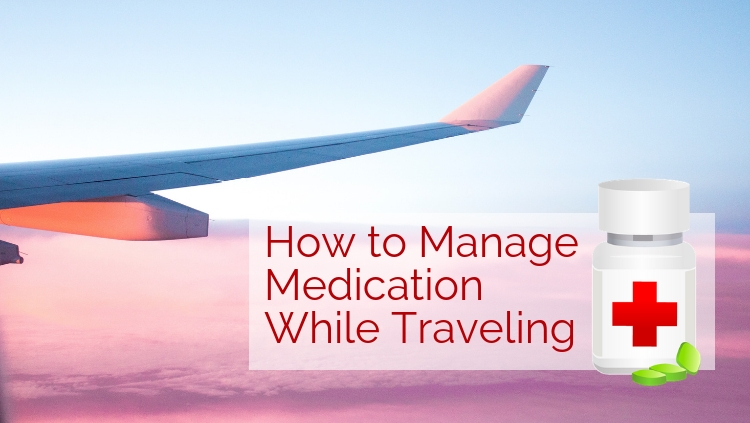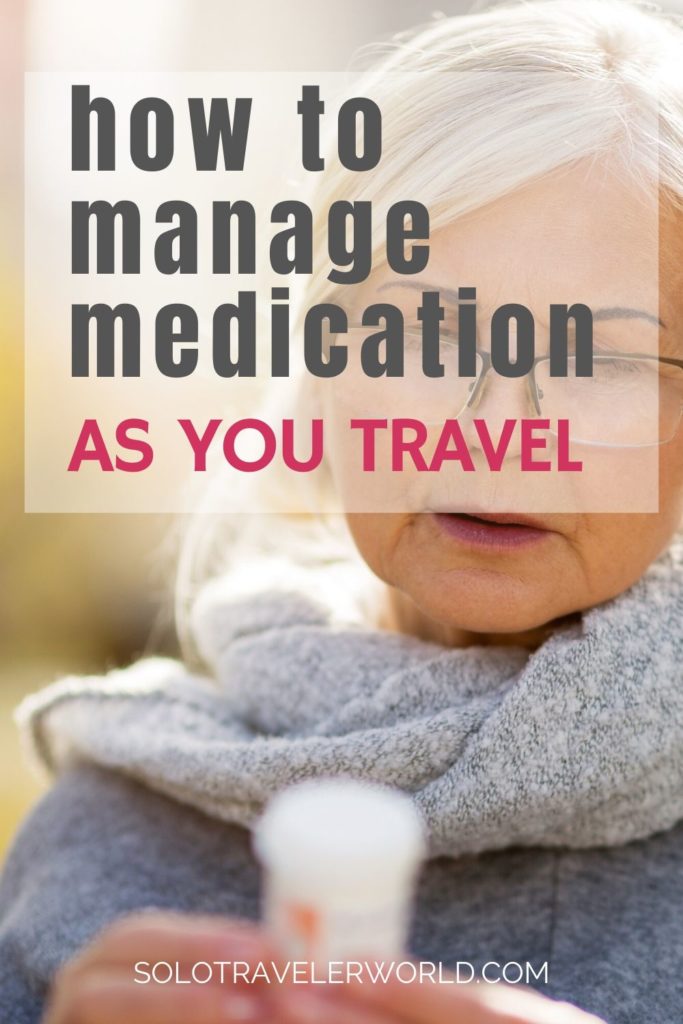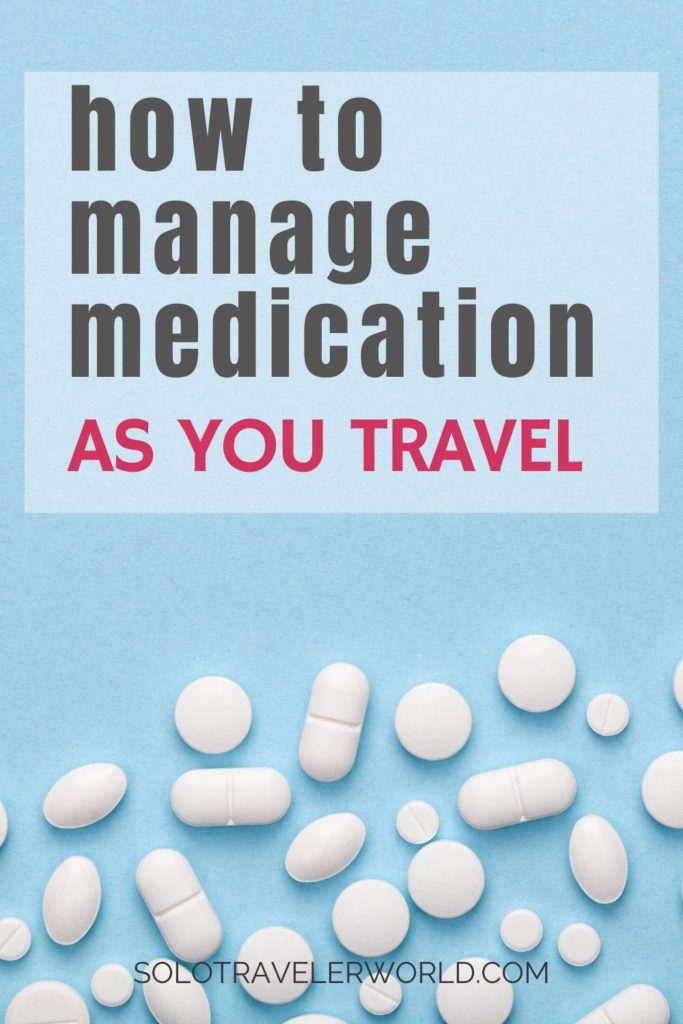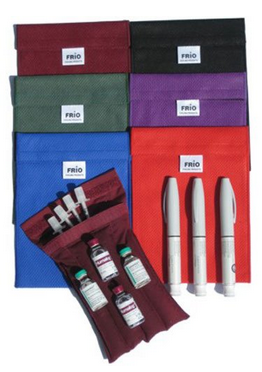
There's a fair amount of general information on the Internet about how to manage medications while traveling.
Yes, there are standard, best practices that a traveler can use.
But there's nothing like hearing from the experiences of other travelers. To do so, we turned to the Solo Travel Society on Facebook. It's how the page works. One person asks a question, we post it, and many people jump in with advice and suggestions.
Collectively, we have much more experience than Tracey and I together. By sharing, we all learn and all of us can travel better.
Here are the standard best practices for managing medication as you travel plus personal experiences from other travelers on how to carry and buy medication on the road.

The Best Way to Carry Prescription Medication as You Travel
There are a number of things to consider when you're carrying medication on your travels. From how it will pass through security to maintaining the medication at the proper temperature if necessary, it's important to think things through before you pack and go.
- They go in your carry-on. So that you are not left without your medication should your checked luggage go astray, pack important medication in your carry-on luggage.
- Manage the temperature. On a flight, packing medications in your carry-on will protect them from the cold temperatures of the baggage hold. But this is not the only place you need to think about the impact of temperature. On a road trip? Don't pack them in the glove compartment. If it's a very hot day, don't even leave them in the car.
- Keep all medications in original bottles. Original bottles with original labels is important. Also, bring a copy of your prescription and a letter from your doctor.
- Confirm that your meds are legal. Some medication is legal at home but not at your destination. Check before you go. The Center for Disease Control and Prevention (CDC) is an excellent resource on medication and travel.
- Make sure you have enough with you. And, in case you stay a little longer, take a little more.
- Liquid volumes and security. You know that the standard acceptable volume of liquids at airport security is 3 oz or 100 ml. If it's a medication, you may pass through security with a slightly larger volume, but it's not a guarantee. You'll be more successful if you advise the security officer of the overage at the beginning of screening. Even better, split a large bottle into two smaller ones that meet guidelines.
Experiences from the Solo Travel Society
A suggestion from Jaylynn – “If you're traveling to a country where people speak a different language than you, carry a written translation of your medication and its generic counterpart as well as your dosage on a card in your wallet. Many medications have a standard name worldwide, but some don't.”
A suggestion from Tom – “Beware of restrictions on American over-the-counter drugs in countries you plan to visit. An American woman was arrested in Mexico for having 7 or 8 Sudafed (pseudoephedrine) pills in her bag when she arrived in Puerto Vallarta. To be on the safe side you'd best have a prescription or at least a doctor's note.”
A question followed by a suggestion from Cheri – “I'm a type 1 diabetic on insulin injections. I've never had an issue with my travels to date with carrying medication (insulin) but I keep a doctor's note and a prescription of my meds with me just in case. Later this year I'm considering traveling around a bit in SE Asia. As my insulin generally needs to be kept refrigerated, I don't want to take vast quantities with me, so if I can access supplies on the go it would be ideal. Any advice on this would be great.”
A suggestion from Cheri – “Check this out. I've used a Frio Cooling Case before on a med that needed to stay cold, it worked great.”
Karina's experience – “I'm in Australia and for all my long-term travels I get a special code from my doctor that enables me to fill multiple scripts all at the same time. It takes at least 15 days more than what is usually required. I also have photos of each prescription on my phone and I carry a Medicare-completed declaration and a full doctor's letter as I carry heavy codeine and morphine-based meds.”

How to Buy Medication as You Travel
Things can happen. Your bags could be stolen or you could forget to scoop up your meds before checking out of your hotel. You should be prepared to buy refills if necessary.
- Carry the generic name of your medications with you. If you need a refill while you're away, you will likely need the generic name of the medicine. Carry that with you as brand names can be slightly different in other countries.
- Carry a note and a new prescription from your doctor. Some medications are pretty typical and have no value on the black market. Others could be quite valuable. Since you're not able to know this, it's wise to have a new prescription from your doctor with you as you travel.
Experiences from the Solo Travel Society
A suggestion from Melanie – “Check out this website. It is The International Society of Travel Medicine. You can look up where you are going and find a doctor who speaks your language. Personally, I went to my local travel doctor and got advice on my medication and prescriptions before traveling as they have the most up to date information on what you can and can't do.”
A suggestion from Janet – “I've had a few prescriptions filled in Africa, Central America, and Asia. Medications are not available everywhere, so find out first if the one you want is available in your destination country. It may be under another name or maker. Do some homework. In some places, you need to make sure that you get real medications and not counterfeits. If you have or can make a trusted local connection, get advice on reliable places to fill prescriptions. Good luck.”
Sherri's experience – “While in Greece in 2012, I simply walked into a pharmacy there and the pharmacist filled my request with the antibiotic she thought I needed at the time (unlike in the US, where this is not possible without doctor-written prescription.) I didn't bother with claiming insurance as it was really cheap (less than my flat fee cost share). I have also carried about 7 weeks of my prescription meds, labels attached, with no problems (US>London>Athens return with a stopover in Canada on my way home).”
Anil's experience – “I have never faced a problem refilling a prescription while in countries like Vietnam, Thailand, and Cambodia. I've sometimes had challenges in the United States as many medicines aren't sold over the counter. One needs a prescription. So one good thing is to keep prescription papers with you always (and even then it can be challenging at times).”
Diane's experience – “I was lucky while traveling for 6 months that the one medication I take, which requires a prescription in the US, was cheap and freely available over the counter everywhere I traveled.”
Kathryn's experience – “I traveled with a long-term supply of my medication and took a doctor's letter with me in case I needed to show it to customs. I had to show it once. If you are traveling in SE Asia be careful as some places are renowned for selling counterfeit medications.”
Sherryl's experience – “I haven't traveled longer than 3 months yet. So far, I'm just taking all my medications in their original pharmacist-labeled containers. I've never had a problem anywhere. I had one prescription filled in Singapore by seeing a local doctor and explaining my condition requiring the script, because my home pharmacy didn't have it ready before I left the country. In Siem Reap I was able to get another of my meds over the counter. It appeared legit. How would one know if it's counterfeit?”

How to Manage Your Medication Schedule While Traveling
Keeping track of medication doses when you're off your regular routine and distracted by the excitement of travel can be a challenge. Here are a few things you can do.
- Get your prescription in multi-dose packages. More and more pharmacies are offering this service. Ask for your pills in “multi-dose” packages. All the pills you take will be grouped into packets according to the day and time you need to take them, making it easier to manage your medication schedule.
- It's the intervals between doses that counts. Traveling across time zones may complicate your medication schedule. Set an alarm on your smartphone to help you keep the same interval between doses. If you're going to be away for a long period, you can slowly move the interval to a convenient time of day. Consult with your pharmacist on how much time variance is okay with your meds.
- Know your sun risks. Some destinations have longer periods of daylight and more intense sun than others. Find out whether your medication makes you more sensitive to the sun and take the proper precautions with a good sunscreen.


